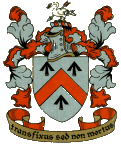

Genealogy
Introduction to Basic Genealogy
This will be for anyone that is interested in getting started doing research on their families' history. Also, these pages are for the new beginning genealogists, young or old, who need a little help getting started. Remember to always have fun and enjoy yourself. It truly makes history fun by making it more personal to you.
Questions To Ask
Here are some questions you can ask your parents, grandparents, aunts and uncles.
Where to do your research
Library: After you have asked the above questions it is now time to go and begin your research. A good place to begin is at your local library. Most libraries have a genealogy or family history section. If you are not sure ask the librarian they will assist you in finding that area of the library.
When you have found this section, walk around and make yourself familiar with what books are available. These books are kept at the library so you will have to do your research while at the library. See if they have books that other people have written on the surname you are researching. Also ask the librarian where and if they have information they keep that other researchers have donated to the library. These would be called vertical files. Also ask them if they have a list they keep of surnames that others are researching that have visited the library. The majority of libraries will allow you to make copies from books.
Then you will want to go from the books to microfiche or to microfilm. If you haven't used a microfiche or microfilm reader/printer you might want to get the librarian to assist you.
Archives: While at the library ask if your county has an archives. This will be a location where all and most actual documents will be kept and perserved for future generations. In some archives you will be able to hold the actual documents of your ancestors. Also the people who work in the archives are very knowledgable about the history of the area. They are sometimes knowledgable of others in your community that are working on different families in your area. Normally getting copies of actual documents is more expenses than getting them off of microfiche or microfilm. You will need to ask because the cost varies greatly from one archives to the next.
Ask if they keep the deed records in the archives or are they kept in the Court House. Here you will find the records of property. This will be helpful in knowing what lands your ancestors owned, where they were located and their neighbors.
Court House/County Court Clerk: Here you will find deeds, birth records, marriage records, and voter polls. In some counties you will still find wills and probate records in the court house.
Cemetery: Yes, you can do research at a cemetery. What you can do at a cemetery is take photographs
of headstones of your ancestors. This will assist in keeping records of them for later years and
preserving a record of them. Most counties will have a book that is on the cemeteries, so you can
refer to this book for your ancestors.
Writing A Family History
A lot of people think that genealogy is just a dry list of names and dates. But, with the simple addition of personal memories and family stories, genealogy can be much more than that. Buried in the memories of your relatives are stories just waiting to be told. Even in your own mind, there are memories worth preserving. A tape recorded interview is an excellent way to preserve these stories and memories. A tape recorded interview has the additional benefit of preserving the person's voice for prosperity.
Here are a few tips for doing a tape recorded interview. First, sit where there will not be a lot of background noise that will be picked up on the tape. Second, make sure that your tape recorder is in good working order. If you are using batteries in your tape recorder, make sure that you have fresh batteries. Finally, some people are intimidated with the idea of speaking into a tape recorder, so try to place it a little off to the side so that it is not staring them in the face while they are talking.
Remember, every family has skeletons in the closet, and some may not want to talk about those things or have generally known. It is possible for those facts to be withheld from the copies of the family history that are circulated to others for a specified period time or until after a certain event (like the death of someone, or the death of everyone in a certain generation). But by writing down the story now you can be certain that it will not be lost for all time, after all none of us can be assured of tomorrow.
The November 1973 issue of The New Era magazine carried an article writen by William G. Harley entitled "Suggested Family Oral History Topics" on page 21. The article includes an excellent outline that you can use to help you organize yourself.
You may find using an outline the easiest way to write a biography or do an oral history interview. While the list may seem long when you first look it, you will find that the general topics will help the person remember many stories. This outline is just a general guide to help you develop specific questions for the person you are interviewing.
Remember you want details, as many and as specific as possible. When talking about their childhood home, encourage them to remember details of what it was like: What type of house was it? How many bedrooms? Did they share a bedroom or even a bed with others? What type of yard did they have? What type of neighborhood was it? What types of appliances where in their house? You are a reporter digging for facts, follow your instincts and satisfy your curiosity when asking questions.
Even if you fear that you will not have enough time to cover everything, don't put off asking questions. One, every little bit that you can record now is something that will not be lost. And second, several short interviews are better than one marathon interview anyway.

If you have any comments or recommendations, please me, e-mail me.
This site was updated on Friday 28th January 2000
Many thanks to Dennis Walsh for a lot of the information.
All Trademarks and Symbols are property of their respective owners